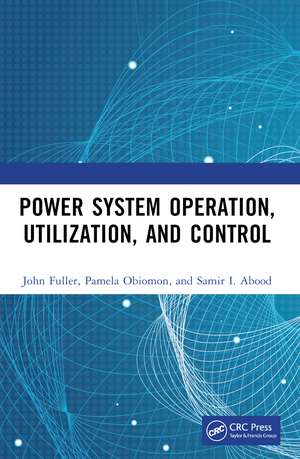Power System Operation, Utilization, and Control
Autor John Fuller, Pamela Obiomon, Samir I. Abooden Limba Engleză Paperback – 26 aug 2024
At the beginning of each chapter, an introduction is given describing the objectives of the chapter. The authors have attempted to present power system parameters in a lucid, logical, step-by-step approach in a lucid, logical, step-by-step approach.
In recognition of requirements by the Accreditation Board for Engineering and Technology (ABET) on integration of engineering computer tools, the authors demonstrate the use of MATLAB® programming in obtaining solutions to engineering power problems. MATLAB is introduced in a student-friendly manner and follow up is given in Appendix A. The use of MATLAB and power system applications arepresented throughout the book.
Practice problems immediately follow each illustrative example. Students can follow the example step-by-step to solve the practice problems. These practice problems test students’ comprehension and reinforce key concepts before moving on to the next chapter. In each chapter, the authors discuss some application aspects of the chapter's concepts using computer programming. The material covered in the chapter applied to at least one or two practical problems to help students see how the concepts are used in real-life situations.
Thoroughly worked examples are provided at the end of every section. These examples give students a solid grasp of the solutions and the confidence to solve similar problems themselves.
Designed for a three-hour semester course on Power System Operation, Utilization, and Control, this book is intended as a textbook for a senior-level undergraduate student in electrical and computer engineering. The prerequisites for a course based on this book are knowledge of standard mathematics, including calculus and complex numbers and basic undergraduate engineering courses.
| Toate formatele și edițiile | Preț | Express |
|---|---|---|
| Paperback (1) | 443.66 lei 6-8 săpt. | |
| CRC Press – 26 aug 2024 | 443.66 lei 6-8 săpt. | |
| Hardback (1) | 1000.27 lei 6-8 săpt. | |
| CRC Press – 21 iul 2022 | 1000.27 lei 6-8 săpt. |
Preț: 443.66 lei
Nou
Puncte Express: 665
Preț estimativ în valută:
84.89€ • 88.87$ • 70.24£
84.89€ • 88.87$ • 70.24£
Carte tipărită la comandă
Livrare economică 05-19 aprilie
Preluare comenzi: 021 569.72.76
Specificații
ISBN-13: 9781032277646
ISBN-10: 1032277645
Pagini: 342
Ilustrații: 316
Dimensiuni: 156 x 234 mm
Greutate: 0.63 kg
Ediția:1
Editura: CRC Press
Colecția CRC Press
Locul publicării:Boca Raton, United States
ISBN-10: 1032277645
Pagini: 342
Ilustrații: 316
Dimensiuni: 156 x 234 mm
Greutate: 0.63 kg
Ediția:1
Editura: CRC Press
Colecția CRC Press
Locul publicării:Boca Raton, United States
Public țintă
AcademicNotă biografică
John Fuller is a Professor of Electrical and Computer Engineering at Prairie View A&M University in Prairie View, Texas. Dr. Fuller is presently the coordinator of Title III funding to the Department of Electrical and Computer Engineering in developing a solar-powered home. He is also Associate Director of the Center for Big Data Management located in the ECE Department.
Pamela Obiomon is the Dean of the Roy G. Perry College of Engineering at Prairie View A&M University. She is the seventh dean of the college and the first female to serve in the role.
Samir I. Abood presently works at Prairie View A & M University/ Electrical and Computer Engineering Department. His main research interests are sustainable power and energy systems, microgrids, power electronics and motor drives, digital PID Controllers, digital methods for electrical measurements, digital signal processing, and control systems.
Pamela Obiomon is the Dean of the Roy G. Perry College of Engineering at Prairie View A&M University. She is the seventh dean of the college and the first female to serve in the role.
Samir I. Abood presently works at Prairie View A & M University/ Electrical and Computer Engineering Department. His main research interests are sustainable power and energy systems, microgrids, power electronics and motor drives, digital PID Controllers, digital methods for electrical measurements, digital signal processing, and control systems.
Cuprins
1. Synchronous Machines. 2. Modelling of Synchronous Generator. 3. Load Frequency Control. 4. Voltage and Reactive Power Control. 5. Power System Optimization. 6. Economic Dispatch. 7. Unit Commitment
8. Power Systems State Estimation. 9. Load Forecasting. Appendix A. Bibliography.
8. Power Systems State Estimation. 9. Load Forecasting. Appendix A. Bibliography.
Descriere
The book provides excellent power system analysis methods and covers all parameters of power systems operation, utilization, and control at the beginning of each chapter, an introduction that states the chapter objectives. All principles are presented in a lucid, logical, step-by-step approach.
